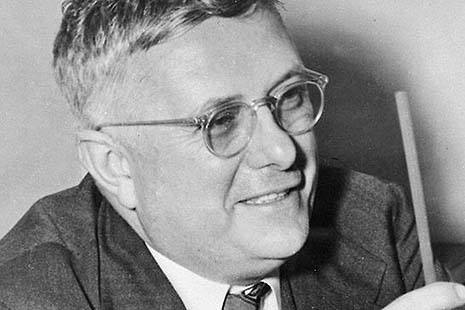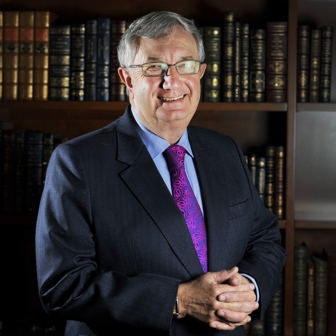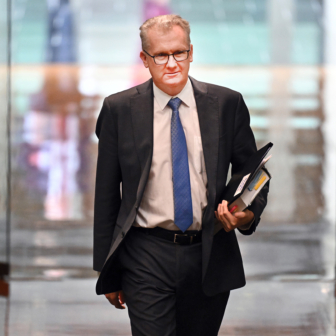THE six-to-one High Court verdict was devastating to the government. At a time of global economic and political instability, a relatively new but unpopular prime minister – one widely criticised for breaking election promises – had taken yet another blow. How could the government fulfil its responsibility to protect national security if the country’s leading judges wouldn’t allow it to do so?
If this scenario seems familiar, it should – and doubly so. It is a fair summary of the Australian scene in March 1951, when Robert Menzies’s Coalition government learned that the High Court of Australia had struck down its Communist Party Dissolution Act. And of course it also bears more than a passing resemblance to the problems of Julia Gillard’s government, right down to its recent High Court reverse over the Malaysian solution.
But even leaving aside Marx’s famous dictum that history repeats itself, the first time as tragedy, the second time as farce, it is doubtful whether federal Labor can take much heart from the similarities.
During 1951, as it tried to deal with a rate of inflation of over 20 per cent and what it believed to be a looming third world war, the Menzies government seemed like a short-term proposition. But for several reasons, including divisions among its opponents and the emergence of greater affluence and economic stability in the mid-1950s, Menzies was able to retire as prime minister fifteen years later without having suffered an election defeat. The Liberal–Country Party government itself managed to hang on until December 1972. Only the wildest optimist among its supporters would suggest that the Gillard government might look forward to such a run of good fortune.
One issue that helped Menzies and the conservatives immensely in these years was communism. At a time when the world was riven by cold war conflict between the United States and the Soviet Union and their allies and satellites, Menzies and his political colleagues harvested the communist issue with ruthless efficiency. Fed by sensational stories from abroad and hysteria among politicians and the press, the public had every reason to believe that the country was riddled with spies, informers and traitors awaiting their opportunity to overthrow democracy.
In reality, the activities of a group of real informants, run by the local Communist official Wally Clayton for the benefit of his Soviet masters, had come to an end by the early 1950s as the result of an effective counter-espionage effort by western intelligence. The Communist Party of Australia itself, moreover, was small and electorally unpopular – its membership had declined from a wartime high of 23,000 to perhaps a little over a fifth of that number by 1951. All the same, some of its members maintained responsible positions in leading trade unions. As such, the party was a convenient scapegoat for a government that had unrealistically raised consumer expectations in order to win the 1949 election.
The Liberal and Country parties had gone into that election promising to ban the Communist Party. Menzies himself came round to this view only gradually: as a lawyer, he understood how principles of British justice would be breached by a peacetime ban of this kind; as a politician, he worried that a ban might simply prompt the Communist Party to continue its operations underground. The Country Party had supported a ban for many years, though, and there were people in the newly formed Liberal Party – especially in New South Wales – who favoured a hard line. The Coalition’s policy solidified in 1948 and, once the election was won, the matter called for action.
The Communist Party Dissolution Bill was introduced into parliament in 1950 as one of the first legislative acts of the new government. It banned the Communist Party and other bodies found to be substantially communist, provided for the seizure of their assets, and prohibited communists from holding office in trade unions or working as Commonwealth public servants. Anyone who sought to continue the operation of a banned organisation would receive five years’ imprisonment. Notoriously, the legislation reversed the onus of proof: unless a “declared” individual was willing to take the stand and testify under oath, that person would need to disprove the accusation of being a communist.
Under ailing leader Ben Chifley, the Labor Party opposed the legislation. The party’s deputy leader, Herbert Vere Evatt, a former attorney-general and a brilliant constitutional lawyer, fought tenaciously and with some success to have some of the most onerous provisions removed. When the bill went to the Labor-controlled Senate, there were further amendments, which the government refused to accept. Chifley wanted to continue the fight, but he was overruled by Labor’s national executive and forced to allow the bill to pass. An immediate challenge occurred in the High Court and, sensationally, Evatt accepted a brief to appear for the Communist-led Waterside Workers Federation. The court, in a six–one decision, struck down the legislation in March, primarily on the grounds that it attempted to usurp the court’s own role of judicial review.
Menzies accepted the judgment rather more graciously than another lawyer and prime minister, Julia Gillard, took her recent reverse over the Malaysian solution. Nonetheless, the government decided to seek a constitutional amendment. By this time, Chifley had died and Evatt had assumed the party leadership. The referendum battle became one between two fine legal minds and bitter political rivals – Menzies and Evatt.
Evatt’s “No” campaign is widely regarded as his finest moment and a landmark in the history of Australian democracy. In the months before the referendum – which was held sixty years ago, on 22 September 1951 – opinion polling suggested that voters would approve the ban. In July, for instance, 80 per cent said they would vote “Yes.” A poll published a month before the vote had the figure at 73 per cent. A large part of the historical drama of the “No” campaign arises from a sense that in the course of a remarkably gritty campaign Evatt was able to turn the situation around. By the eve of the real poll on 22 September, the government had every reason to be worried. A million voters were said to have switched sides in just six weeks.
WHILE he is frequently maligned as mad, bad or both – mentally unstable, soft on communism, obnoxious towards subordinates, disloyal to party and country – Evatt’s many defenders point to his role as Australian external affairs minister during the 1940s in the making of the United Nations and the Universal Declaration of Human Rights. But his main theme in 1951 was the un-British character of the proposed ban – its attempt to punish individuals for their beliefs and associations rather than their breach of the law, its effort to prevent the courts from reviewing the actions of the executive, and its setting aside of common law principles such as the presumption of innocence. For Evatt, the autonomy and freedom of the individual would be undermined by the very existence of the arbitrary powers demanded by the government; they would not need to be exercised on any particular occasion to turn citizens into slaves. As he put it in one speech, “Few will dare lift their voices to defend the underdog or defy the bully if by so doing the perjurer, the pimp or the informer can whisper into the ear of the Security Police.”
In an Australia that still regarded itself as British, the appeal of these debating points is easy to understand. And with an Anglophile such as Menzies as his major opponent, a political tactician with any nous would have noticed the prime minister’s vulnerability on this score. Travelling to meetings all over the country, often delivering several speeches and broadcasts in a single day, Evatt made a powerful case that the powers sought by the government should not be granted in a “British” community.
The matter was contentious, not only between the parties but also within them. A group of right-wing Catholic Laborites centred on Victoria all but advocated a “Yes” vote. And among the Liberal Party rank and file, there were members prepared to speak out about the danger to civil liberties that a “Yes” vote posed. Uncertainty and confusion, claim and counter-claim, were hardly calculated to help Menzies; party disagreement has always been fatal to referendum proposals.
The changes themselves seemed almost calculated to panic voters. The government not only asked for the authority to enact the amended Communist Party Dissolution Act, it also asked for the right to be able to amend it. The term “communist” was defined in vague terms to mean anyone “who supports or advocates the objectives, policies, teachings, principles or practices of communism, as expounded by Marx and Lenin.” Menzies’s own accidental but notorious inclusion of non-Communists on a list of supposed Communists he read out in the House of Representatives in 1950 would have served to underline the dangers of so empowering the government. Meanwhile, the prime minister’s behaviour at his unruly meetings – such as his disparaging remarks to and about interjectors, and his references to Communist “scum” and “rats” – made him look like the dictator in the making that Evatt implied he was.
Menzies had other problems, too, such as runaway inflation partly stimulated by the outbreak of the Korean War in mid-1950. “What about the price of onions?” one interjector called out at a Menzies meeting in Adelaide. “You will put us on the dole again,” called out another in Hobart. “Where’s your Jap flag?” an interjector asked as a street-corner meeting in Sydney. The Japanese Peace Treaty had only just been signed, and one of Evatt’s themes was that “communist” might be defined to include people critical of the government’s “attitude to Japanese rearmament.” The recent announcement that thousands of Commonwealth public servants would be dismissed, a financial crisis in Victoria, and the likelihood of a horror federal budget straight after the referendum provided the perfect circumstances for a large protest vote.
Nonetheless, at a time when Australian forces were fighting communists in Korea, cold war anti-communism had wide and deep appeal. Evatt needed to make a case that would persuade the confused or suspicious – hostile though they were to “totalitarianism” – that they should vote “No.” Evatt’s triumph was to turn the rhetoric of cold war anti-communism back on his opponents. His technique was to associate the government’s proposed methods with “the revolutionary procedures of totalitarianism and Fascism” and argue against attacking “communism by the methods of the jackboot, the spy system and the concentration camp.”
In one of the propaganda victories of the campaign, Evatt released a press statement that made potent and dramatic reference to the second world war and especially the triumph of Nazism. “First the Reds, then the Jews, then the Trade Unions, then the Social Democratic Parties, then the Catholic Centre Party and then the Roman Catholic and Lutheran Churches,” he wrote. “It is the old totalitarian road; the road that led to the horrors of Belsen; the way that cost millions of lives in the Second World War and the untold sacrifices of our peoples in the world struggle against Hitler, Mussolini and Japan.”
Evatt was adapting a famous quotation from Martin Niemöller, the anti-Nazi theologian. References to both the Nazis and the Holocaust in everyday political debate were less hackneyed in 1951 than they have become since, and probably more meaningful for a generation that had sacrificed much in the defence of freedom during the war.
About 50.5 per cent of Australians voted “No” on 22 September – a very narrow victory for Evatt and his supporters. The proposal was also rejected by a majority of voters in half the states: New South Wales, Victoria and South Australia. Under the terms of the constitution, which required the approval of a majority of voters and a “Yes” vote in four of the six states, the referendum had failed. In radical mythology, the result sits alongside the defeat of conscription in 1916–17 as a victory for democracy and freedom.
BUT the lessons of 1951 for today’s politicians are perhaps less straightforward than they might seem. Evatt was not an entirely consistent defender of individual liberties throughout his career. Not a few of his claims during the campaign seem wildly exaggerated, even allowing for the passions of the moment and his overwhelming desire to defeat a measure he rightly regarded as obnoxious. He appealed to people’s fears as much as to their reason or attachment to fair play. And he cashed in on the government’s unpopularity over barely related issues, such as the Japanese Peace Treaty, increasing taxes, and spending cuts.
In today’s politics, with its 24/7 news cycle and constant polling, the pressure on a political leader to bow to the will of public opinion at any particular moment is much tougher than anything Evatt faced in 1951. The Labor leader had an ordinary politician’s instinct for self-preservation but it is hard to imagine him, or his predecessor Chifley, allowing his actions to be driven by the findings of focus groups. Politics was about taking risks, about backing your own judgment when something was worth fighting for, even in the face of overwhelming media and public opposition. Of Australia’s major newspapers in 1951, only one – the Melbourne Argus – opposed the ban.
Evatt had many personal and political faults, but in August and September 1951 he conducted a brave campaign, and one that helped save Australians from the worst excesses of the cold war. He defended the rights of a deeply unpopular minority at a time when few Australians had any sympathy for them. And, at least for the moment, he refused to place advantage above principle.
Sixty years on, there might be lessons in that for a government whose leader, after the last election, called for a renewed “sense of purpose” in place of an obsession with each evening’s six o’clock news. •




